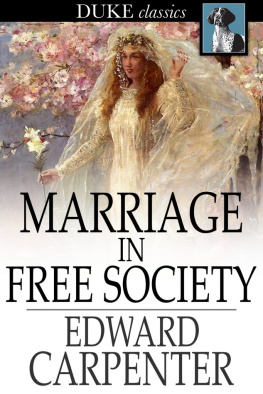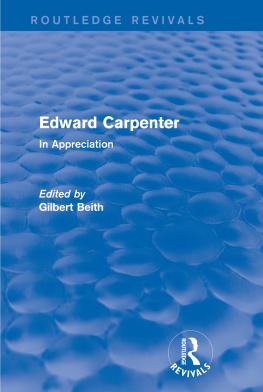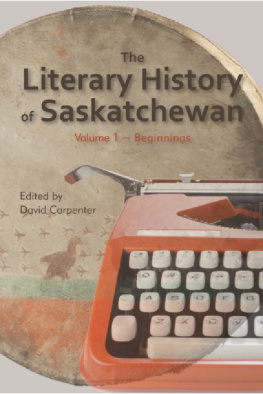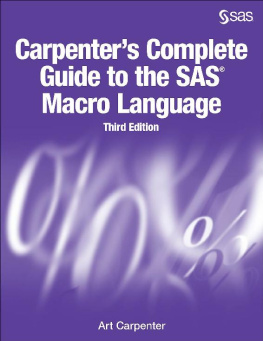CIVILISATION: ITS CAUSE AND CURE
AND OTHER ESSAYS
* * *
EDWARD CARPENTER
*
Civilisation: Its Cause and Cure
And Other Essays
From a 1920 edition
ISBN 978-1-63421-231-1
Duke Classics
2014 Duke Classics and its licensors. All rights reserved.
While every effort has been used to ensure the accuracy and reliability of the information contained in this edition, Duke Classics does not assume liability or responsibility for any errors or omissions in this book. Duke Classics does not accept responsibility for loss suffered as a result of reliance upon the accuracy or currency of information contained in this book.
Contents
*
Preface to Complete Edition
*
In looking over this volume, first published in 1889, with a view to afinal Edition, I am glad to note that after all there is not much in itrequiring alteration. Considering that the original issue took placemore than 30 years ago, I had thought that the great changes inscientific and philosophic thought which have taken place during thatperiod would probably have rendered "out of date" a good deal of thebook.
As a matter of fact, the first paperthat on Civilisationwas given asa lecture before the Fabian Society, in 1888; and I shall not easilyforget the furious attacks which were made upon it on that occasion. Thebookpublished as a whole in 1889came in for a very similar receptionfrom the press-critics. They slated it to the top of their bentexceptin those not unfrequent cases when they ignored it as almost beneathnotice. The whole trend of the thought of the time was against itsconclusions; and it is perhaps worth while to recall these facts inorder to measure how far we have travelled in these 30 years. For to-day(I think we may say) these conclusions are generally admitted ascorrect; and the views which seemed so hazarded and precarious at theearlier date are now fairly accepted and established.
The word Civilisation has undoubtedly during this period suffered anominous change of color. It is no longer an easy term denoting all thatis ideal and delightful in social life, but on the contrary, carrieswith it a sense of doubt and of criticism, as of something that is by nomeans accepted yet, but is rather on its trialif not actuallycondemned!
I am sorry to note, however, that the suggestion made more than once inthe course of my booknamely that the term (Civilisation) shouldproperly be given an historical instead of ideal value, as applicableto a certain period only in the history of each people, has not yet beengenerally taken up. Yet a paper by some more competent person thanmyself on the definite marks and signs of the civilisation-period inHistorytheir first appearance in the course of human progress andevolution, and their probable disappearance again at a laterstagewould be greatly interesting and instructive.
My little essay on this subject was written at the time of itscomposition with a good deal of imaginative lan; and is of courseopen to criticism on that side, as being mainly enthusiastic incharacter and only slenderly supported by exact data, proofs,historical illustrations, analogies, and so forth. But to largely alteror amend the essay without seriously crippling it would be impossible;and though the form may be hurried or inadequate, yet as far as theactual contents and conclusions are concerned I still adhere to themabsolutely, and believe that time will show them to be fully justified.
With regard to my views on Modern Science the last quarter of a centuryhas curiously corroborated them. For while on the one handasexpectedthe progress in actual discovery and application of observedfacts has been enormous, the theories on the other hand about allthese things have receded more and more into the background, and havepassed almost out of sight. While knowing, for instance, infinitely moreabout electrical actions and adaptations than we did, we seem to be ifanything further off than ever from any valid theory of what Electricityis. The same with regard to Heat and Light, to Astronomical,Biological and Geological "laws," and so forth. On such matters ModernScience is on the verge of confessing itself bankrupt, but not wishingto do that, it keeps a discreet silence.
The Atom, which I ventured (to the disgust of my scientific friends) tomake fun of 30 years ago, has now exploded of itself as thoroughly as aGerman "coal-box"; and the fixed Chemical Elements of older days have oflate dissolved into protean vapours and emanations, ions and electrons,impossible to follow through their endless transformations. As to thenumerous "Laws of Nature" which in the nineteenth century we were justabout to establish for all eternity, it is only with the greatestdifficulty that any of these can now be discoveredmost of them havinggot secreted away into the darkness of ancient text-books: where theylead forlorn and sightless existences, like the fish in the caves ofKentucky.
Here againin my chapters on Sciencethough some expressions remainwhich are now out of date, I have thought it best to leave them asoriginally written: the meanings and general conclusions being stillvalid and as they were. It will be seen that the general drift of thesechapters is to point the moral that the true field of science is to befound in Life, and that the best way to know things is to experiencetheir meaning and to identify oneself with them through Action. From astudy on these principles will ultimately emerge a Science truly humaneand creative, masterful, and capable of building a true home formeninstead of the feverish, spectral and self-deluding thing which hasusurped the name up to now.
Something the same will happen with the conception of Morality. Theabstract codes on this subject, which have wrought so much havoc bytheir fatal intrusion on the field of human Life, are rapidly fadingaway. These ghosts, like the ghosts of Nature's "Laws," are receivingtheir quietus. And the general outline which was suggested in "TheDefence of Criminals" has now been traced more positively in the chapteron "The New Morality" inserted at the end of the present volume.Morality has at last to become truly human, and the real expression ofour organic need. Man has to be liberated from the cramps andsuppressions and fixations which have hitherto paralysed him in themoral field. He has to emerge from the swathing bands of his pupal stageinto the free air of heaven, and to become in the highest senseself-determining and creative.
Thus three things, (1) the realisation of a new order of Society, inclosest touch with Nature, and in which the diseases of class-dominationand Parasitism will have finally ceased; (2) the realisation of aScience which will no longer be a mere thing of the brain, but a part ofActual Life; and (3) the realisation of a Morality which will signaliseand express the vital and organic unity of man with his fellowsthesethree things will become the heralds of a new era of humanityan erawhich will possibly prefer not to call itself by the name ofCivilisation.
In order to corroborate and confirm the first paper in the book anAppendix has now been added containing notes and data on the life andcustoms of many "uncivilised" peoples; for much of which Appendix I amindebted to the assistance of my widely-read and resourceful friend, E.Bertram Lloyd.
E. C.
December, 1920.
Civilisation:Its Cause and Cure
*
The friendly and flowing savage, who is he? Is he waiting forcivilisation, or is he past it, and mastering it?WHITMAN.










